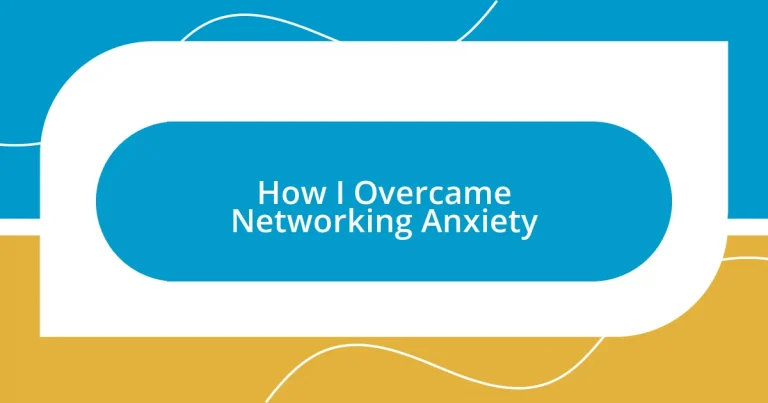Key takeaways:
- Identifying personal triggers, such as fear of judgment and pressure to impress, can help manage networking anxiety effectively.
- Shifting the mindset from self-doubt to curiosity allows for more genuine connections and transforms networking into an enjoyable process.
- Setting achievable networking goals and reflecting on progress fosters confidence, encouraging meaningful conversations rather than superficial interactions.

Understanding Networking Anxiety
Networking anxiety can be an overwhelming feeling, often rooted in the fear of judgment or rejection. I remember stepping into a room full of strangers, my heart racing and palms sweating. Have you ever felt like everyone else is effortlessly connecting while you stand on the sidelines, tongue-tied and clammy?
This apprehension is more common than we realize. I once convinced myself that my introverted nature was a barrier to effective networking. But honestly, isn’t it fascinating how many people share that same fear? It makes you wonder if we all approach networking with a touch of insecurity.
Understanding networking anxiety isn’t just about recognizing it; it’s about facing it head-on. I learned that by embracing vulnerability, I could transform my fear into an opportunity for genuine connection. What if, instead of seeing networking as a daunting task, we viewed it as a chance to share our stories and hear others’ experiences?
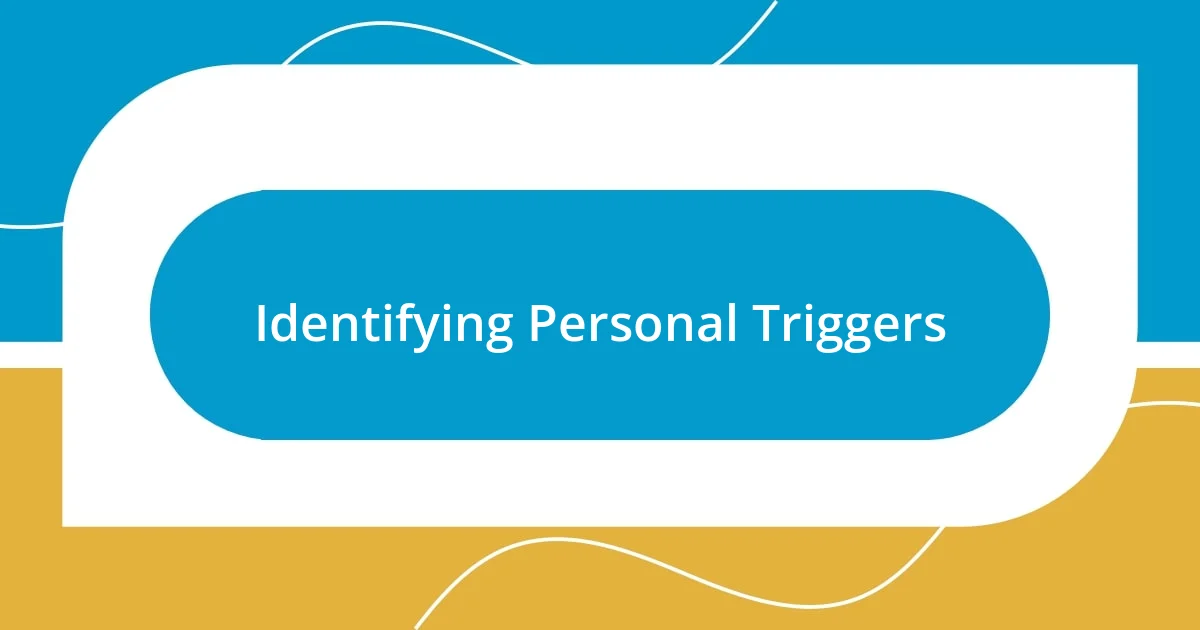
Identifying Personal Triggers
Identifying personal triggers is essential for managing networking anxiety. For me, one major trigger is the fear of speaking in front of large groups. The moment I sense a crowd gathering, my mind races with thoughts like, “What if I say something silly?” Recognizing this fear helped me accept that it’s okay to feel nervous; I’m not alone.
Another trigger I identified is the pressure to make a good impression during introductions. I vividly recall a networking event where I stumbled over my words and thought everyone was silently judging me. That moment of embarrassment led me to realize how often I focus on others’ perceptions instead of just being myself. Once I acknowledged this trigger, I shifted my mindset to focus on meaningful conversations rather than superficial small talk.
In addition to acknowledging my triggers, I learned to create practical coping strategies. For example, I started preparing a few conversation starters before events. By listing topics I felt comfortable discussing, I gained confidence and lessened my anxiety. What about you? Have you tried similar strategies to tackle your triggers?
| Trigger | Personal Experience |
|---|---|
| Fear of Judgment | Feeling anxious about how others perceive me, especially in group settings. |
| Pressure to Impress | Stumbling over words led me to focus more on genuine connections instead. |
| Overthinking Conversations | Prepping conversation starters helped me feel more at ease and prepared. |
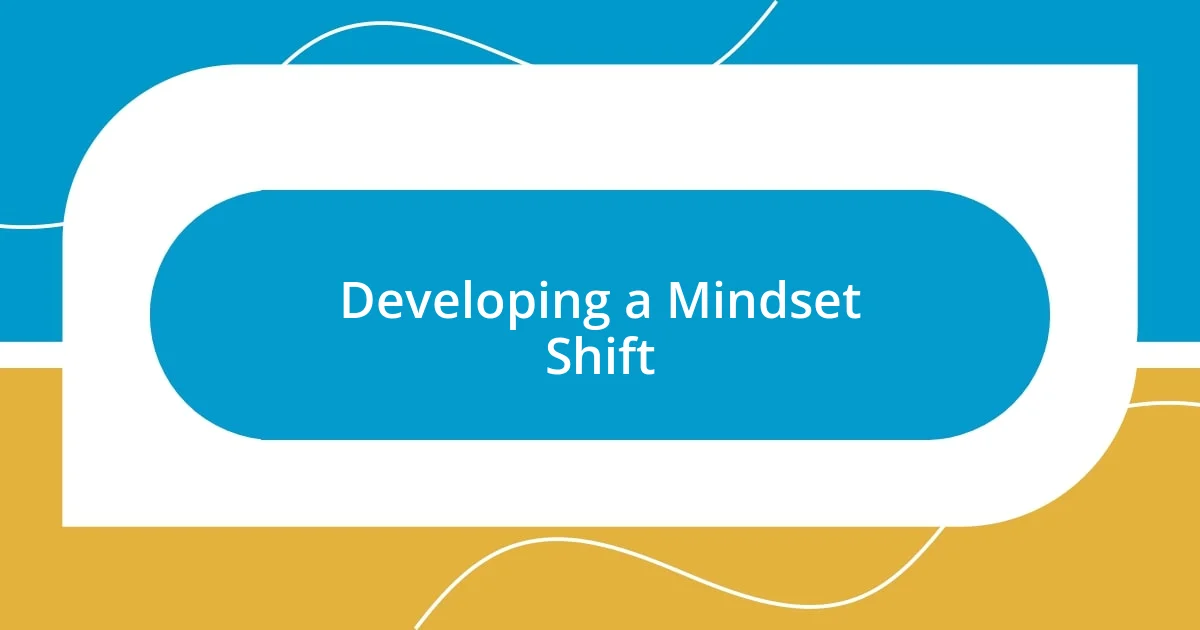
Developing a Mindset Shift
Developing a mindset shift was a game-changer for me. I started seeing networking not as a chore, but as an exciting opportunity to meet fascinating people. I can still recall the moment when I decided to approach networking as a two-way street—an exchange rather than a performance. Embracing this perspective helped me feel less pressure to impress and more enthusiastic about connecting.
- Shift focus from self-doubt to curiosity about others.
- Acknowledge that everyone has insecurities; you’re not alone.
- Transform nervous energy into excitement by thinking of networking as an adventure.
This shift requires practice and intentionality. I vividly remember a recent event where I approached someone who seemed just as anxious as I was. Instead of worrying about what to say, I simply smiled and asked about their interests. That authentic, low-pressure start turned a potentially awkward encounter into a meaningful connection. By approaching networking this way, my anxiety began to fade, and I started to enjoy the process.
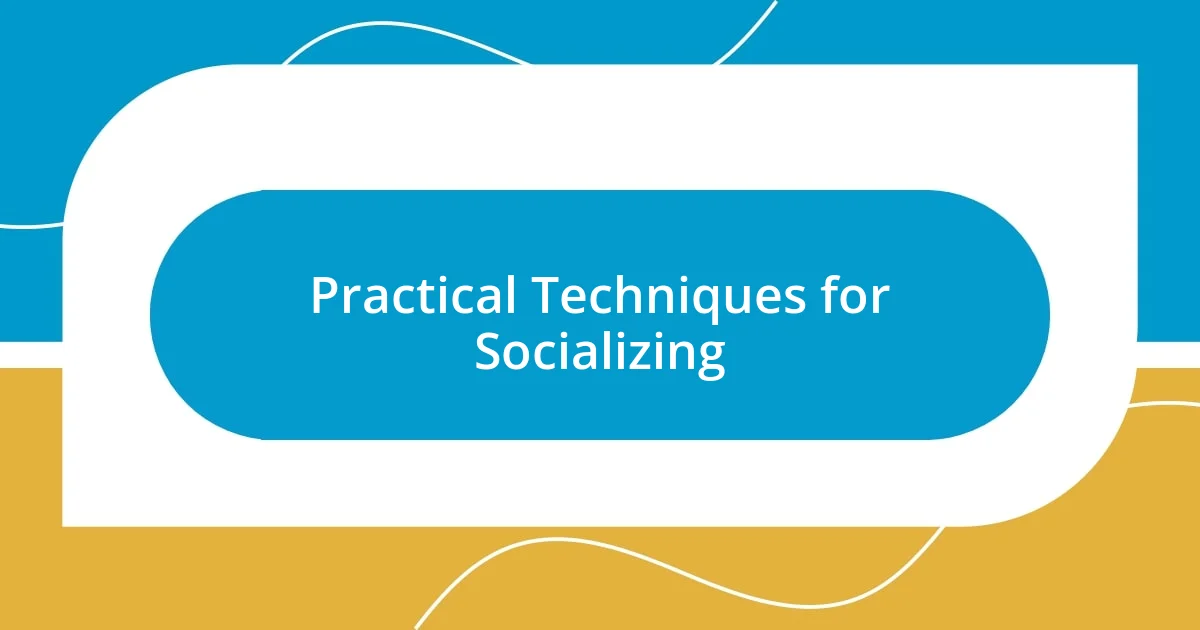
Practical Techniques for Socializing
When it comes to socializing, I’ve found that practicing active listening is incredibly powerful. I used to get so caught up in preparing my next response that I often missed what others were saying. One time, during a small gathering, I focused solely on listening rather than formulating my reply. That shift allowed me to engage genuinely, leading to a deeper conversation that I hadn’t anticipated. Have you ever noticed how people light up when they feel heard?
Another technique I’ve embraced is the art of small, manageable interactions. Instead of diving into lengthy conversations with strangers, I started with simple greetings or comments about the environment. I remember attending a conference and striking up a chat with someone about the coffee selection. That casual introduction eased my anxiety and turned into a delightful conversation about our shared interests. Remember, it’s the little wins that build your confidence.
Lastly, I experimented with setting goals for each event I attended. For instance, instead of pressuring myself to meet a certain number of people, I aimed to have one meaningful conversation. I recall feeling an incredible sense of achievement after a recent networking event where I had just one enriching discussion on a topic I loved. That experience taught me that quality often trumps quantity in social settings, and each meaningful connection can pave the way for future opportunities. How about you? Have you set any personal goals when it comes to socializing?
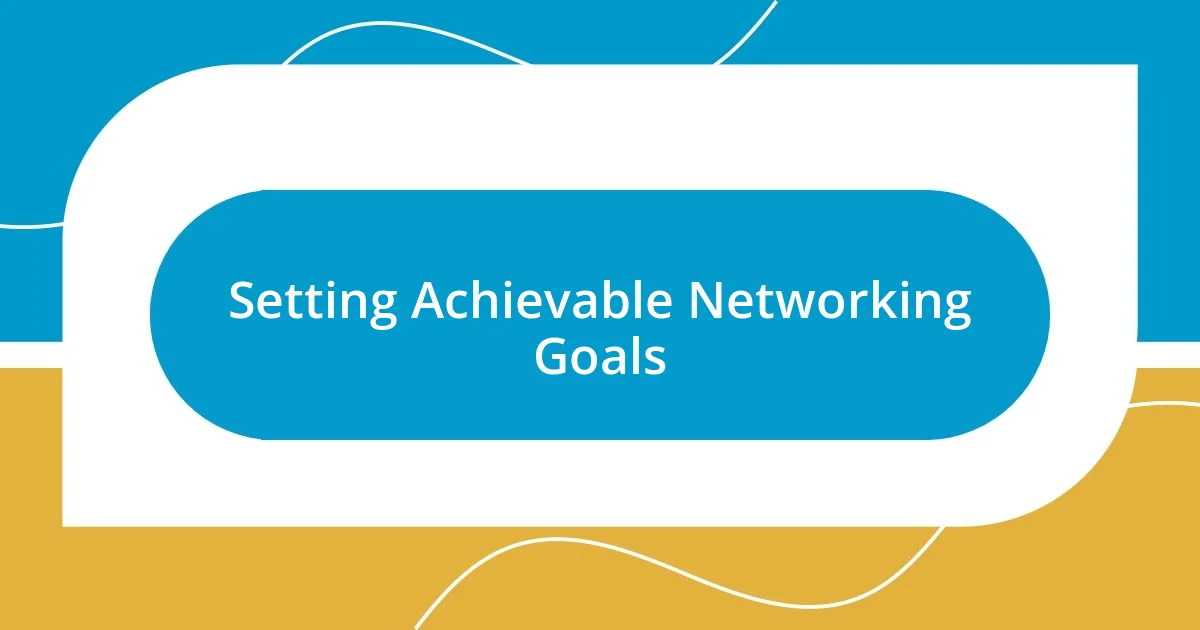
Setting Achievable Networking Goals
Setting achievable networking goals transformed my approach to socializing. Instead of overwhelming myself with the idea of “networking,” I began focusing on smaller, attainable objectives. For example, at my last industry meetup, I set a goal to engage in just two meaningful conversations. This clear target made the event feel less daunting and gave me a refreshing sense of purpose.
I’ve discovered that specificity can lead to greater success in networking efforts. Rather than aiming to meet five new people, I decided to ask a unique question to spark genuine conversations. One memorable moment occurred when I asked a fellow attendee about their favorite project. This not only broke the ice but also shifted our conversation into passionate topics we both cared about. Have you ever thought about how powerful a simple question can be?
Additionally, tracking my progress helped build my confidence. I started jotting down my networking experiences, focusing on the connections I made rather than the awkward moments. After a networking event where I conversed with someone I admired, I felt a wave of pride when I reflected on how far I’d come. This practice of setting and reviewing goals allowed me to celebrate small victories, reinforcing the idea that every connection counts, no matter how seemingly minor. What’s your approach to reflecting on your networking journey?
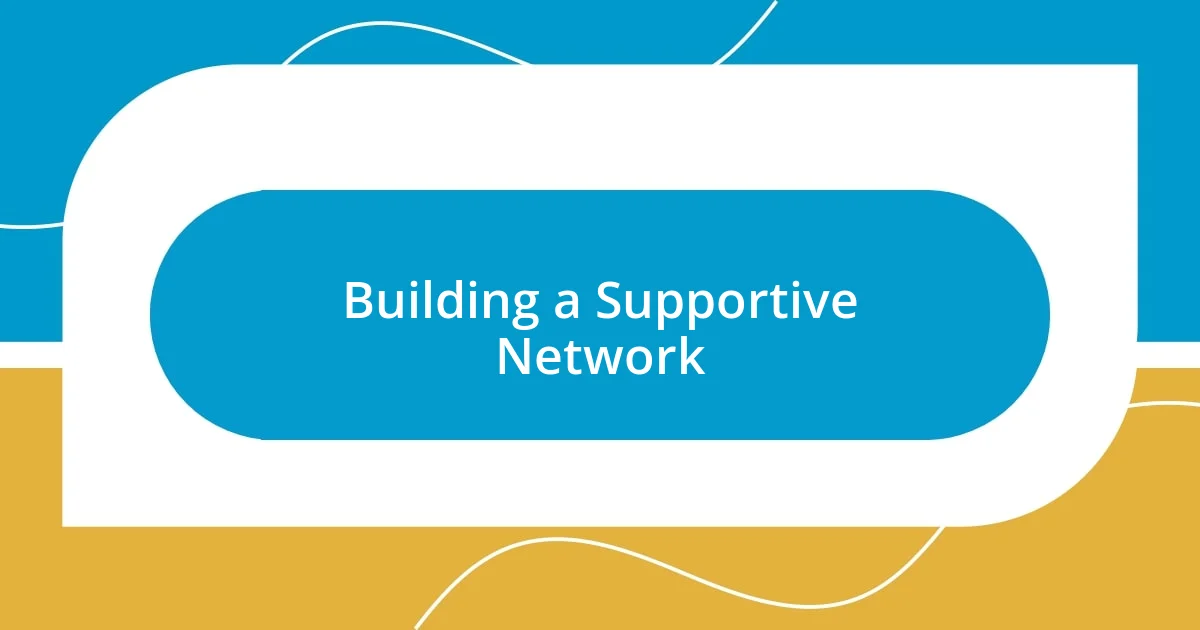
Building a Supportive Network
Building a supportive network starts with surrounding yourself with people who understand your journey and resonate with your experiences. I vividly recall joining a local group focused on professional development. At my first meeting, I felt a mix of excitement and anxiety, yet the warm welcomes and shared stories made me realize that everyone was there for the same reason: to grow and connect. Have you ever found a place where you felt instantly at home?
As I engaged with various members, I discovered the importance of vulnerability in building deeper relationships. One evening, I shared my struggles with networking anxiety during a group discussion. To my surprise, several others opened up about similar challenges. That moment of honesty created an instant bond among us; I realized I wasn’t alone. How freeing is it to speak your truth and find support in others?
Additionally, I’ve learned to be intentional about maintaining these connections over time. I often reach out for casual catch-ups, whether it’s over coffee or a quick video call. One of my closest connections began with a simple lunch invitation after a workshop. Today, we not only encourage each other in our careers but also share laughs and life updates. Building this supportive network has been a game-changer—it’s like having a safety net while I navigate my professional journey. How might your network change if you nurtured your connections in a similar way?
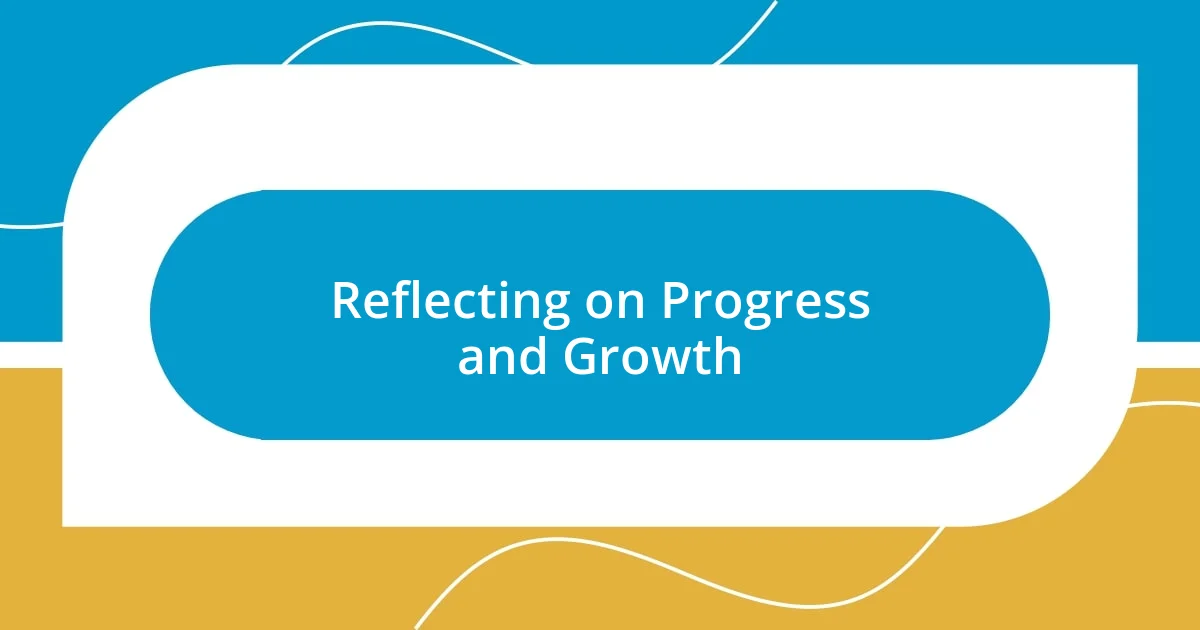
Reflecting on Progress and Growth
Reflecting on my journey, I can’t help but marvel at the growth I’ve experienced. I remember the first time I attended a networking event, feeling paralyzed by the thought of striking up a conversation. Now, I look back and see how much my confidence has blossomed, turning what once felt like a daunting task into an opportunity for genuine engagement. Have you ever felt the thrill of overcoming something that once held you back?
As I revisit my past networking experiences, I notice a pattern of gradual improvement. Each interaction, from awkward small talk to engaging storytelling, contributed to my development. There was one event where I stumbled through introductions, but by the next one, I was genuinely enjoying myself, cracking jokes, and making real connections. This trajectory inspired me to appreciate not just the final outcomes but each step of the process. Isn’t it encouraging to realize that every attempt shapes our abilities?
Moreover, I recently took the time to document my reflections in a journal, noting my progress after each event. This not only highlighted my achievements but also illuminated moments of discomfort where I learned valuable lessons. I can vividly recall a particularly challenging encounter where I misread social cues. Instead of feeling defeated, I acknowledged the lesson learned and felt a sense of growth. How often do we fail to celebrate these moments of learning? Embracing them has become a key part of my journey.












